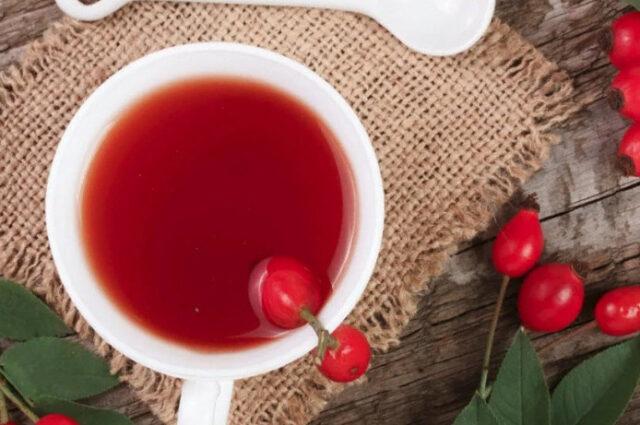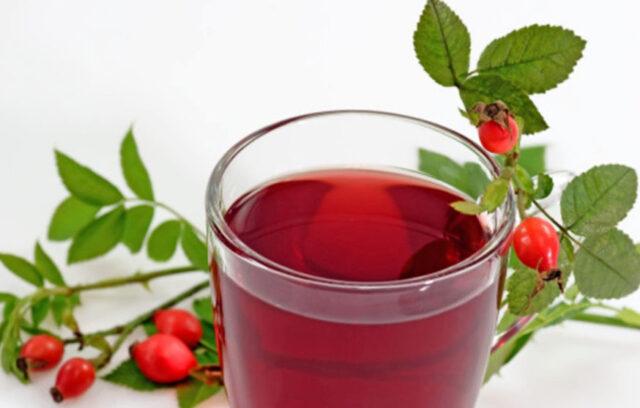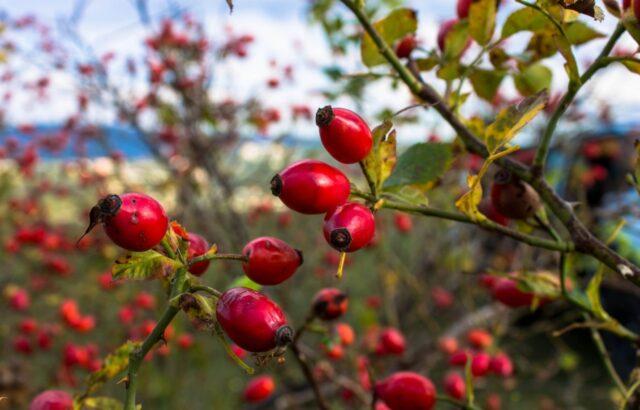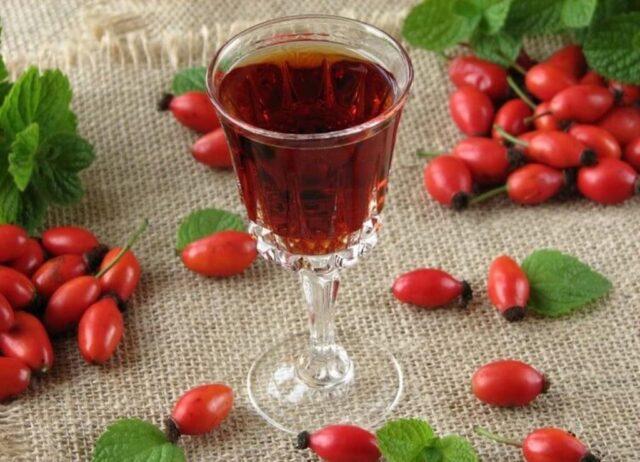Content
Rosehip juice is good for the health of both adults and children. Nothing can compare with the fruits of this plant in the amount of vitamin C, it helps to protect the body from viruses, and supplies it with many useful substances. The berries are often harvested for the winter in dried form, and they also make jam, pasta and delicious juice from it.

Fresh rosehip juice retains all the vitamins that make up the berries
The chemical composition of the juice
Rosehip is primarily prized for its high ascorbic acid content. There, its amount is 10 times higher than in black currant, and 50 times higher than in lemon, and rosehip juice contains up to 444% of this organic matter. In addition, the drink is rich in vitamin A - 15% and beta-carotene - 16%. These components play an important role in the proper functioning of the human body:
- A - is responsible for the health of the eyes and skin, reproductive function.
- B - has antioxidant properties.
- C - supports immunity, participates in redox reactions.
Among other useful substances that make up the berry and juice from it are vitamins E, B1, B2, PP, K. In addition, the drink is rich in iron, phosphorus, zinc, magnesium, as well as potassium and calcium, which are responsible for the work cardiovascular system, ensure a normal metabolism and help bones become stronger.
Why is rosehip juice useful?
The beneficial properties of rosehip juice are manifested in case of ailments associated with a lack of vitamin C. It normalizes the activity of the intestines, kidneys, liver, stomach, and activates blood circulation. The drink is of great help to the body in the fight against infectious diseases, strengthens the immune system. Also, rosehip juice has a beneficial effect on the work of the brain and genitals, improves memory, is indispensable for anemia and atherosclerosis. Doctors recommend drinking it in cases when wounds heal poorly or bones grow together slowly in fractures. The drink has a positive effect on metabolic processes, helps with uterine bleeding and weak secretion of the gastrointestinal tract. Rosehip juice fights the development of many diseases, including cancer. It is considered an excellent cure for vascular fragility. But most often it is drunk as a preventive measure against colds and flu during the rainy and cold season.

Rosehip juice is the largest supplier of vitamin C
Is it possible for children
Rosehip is considered an allergenic product, so it is given to children with caution. Such drinks can cause itching, irritation, a rash on the skin, which is why it is advisable to consult a doctor before using. If decoctions from fruits begin to be introduced into the diet of babies from the age of six months, then it is better to give rosehip juice to children after a year, while carefully observing the reaction of the growing organism. After making sure that the drink does not cause allergies in the child, the amount of nectar consumed per day can be gradually increased, bringing it to half a glass.
How to make rosehip juice at home
Any housewife can make rosehip juice at home, there is no great difficulty in this.To prepare it, you will need only ripe fruits of the plant, citric acid and water, if desired - sugar. First of all, the berries are washed well, the stalks are removed, cut lengthwise into two parts. Then, in boiling water at the rate of 1 kg of fruit, 1 glass of liquid is placed a rosehip, the broth is allowed to boil and removed from the heat. Cover the container with the berry, insist for at least four hours. After that, the juice is poured through a sieve, the berries are ground, citric acid is added to the resulting nectar, and brought to a boil. The finished drink is poured into sterilized jars and rolled up with lids. If the juice is made with sugar, then it is added at the end of cooking and the broth is boiled until the product is completely dissolved.

To prepare nectar, take the ripe fruits of bright orange or red color.
How much and how to drink correctly
Several studies have shown that daily consumption of any rosehip beverage can significantly improve health. If you drink the daily norm of juice every day, you can increase immunity, get rid of fatigue, and improve the digestion process. For older people, drinking can help reduce the likelihood of a heart attack or stroke.
The maximum benefit from rosehip juice and the minimum harm will be rendered if taken correctly and in a dosage appropriate for age. To avoid negative consequences, experts advise drinking the broth for no more than two months in a row. Then take a two-week break.
As for the daily norm of the product, it will be different depending on age and disease, but usually they drink a day:
- adults - 200 ml;
- children over 7 years old - 100 ml each;
- preschoolers - 50 ml.
It should also be noted that in order to determine the exact dosage of juice that can be given to a child, it is better to consult a pediatrician or immunologist.
It is recommended to drink the drink through a straw, on an empty stomach, several hours before a meal. Since the plant has a diuretic effect, it is advisable to take products prepared on the basis of rosehips, preferably 3-4 hours before going to bed. So that the juice does not harm the stomach, it must be diluted with water in a 1: 1 ratio.
Contraindications
Rosehip juice is not good for all people. There are some diseases in which its use can be hazardous to health. Due to the high content of vitamin C, nectar is contraindicated for people with high acidity, gastritis, duodenal ulcer and stomach. Juice should not be drunk by those who have an allergic reaction to it. Since it contains a lot of vitamin K, it is better to refrain from using it for people suffering from endocarditis, thrombophlebitis and heart failure. For women carrying a child, it is also undesirable to drink rosehip juice, since a large amount of ascorbic acid can lead to miscarriage. Berry abuse can be accompanied by pain in the abdomen, muscles, liver, and migraine.

Drinking in large doses can lead to the development of diseases
Conclusion
Rosehip juice is useful for many diseases, it is also used as a preventive measure against various ailments. In the absence of allergies, nectar is often given to children in order to protect them from colds. The drink is highly concentrated, it is drunk strictly in the recommended doses to avoid an excess of vitamins. Often honey is put in rosehip juice, thereby improving its taste and further enriching the composition.








